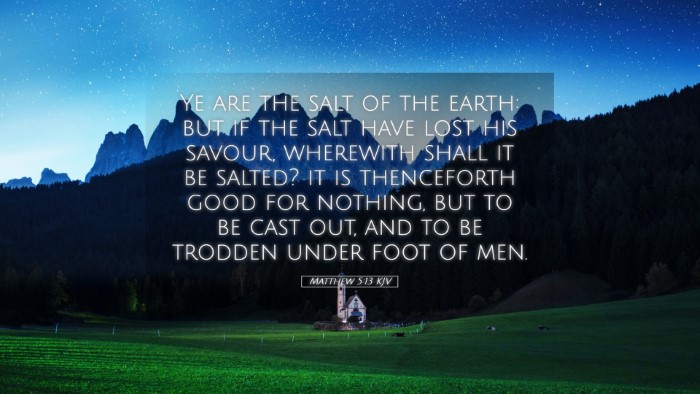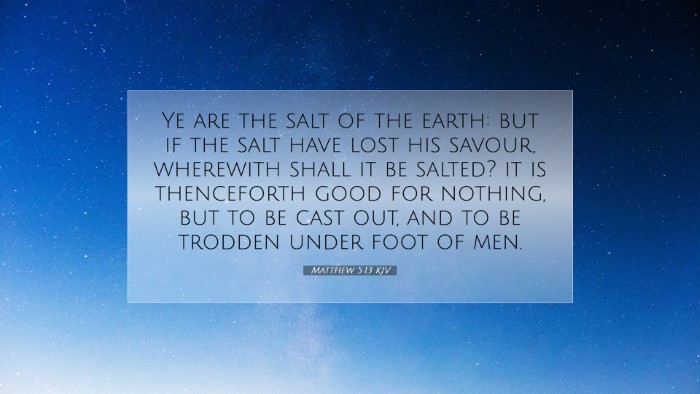Commentary on Matthew 5:13
Verse Reference: Matthew 5:13 - "Ye are the salt of the earth: but if the salt have lost his savour, wherewith shall it be salted? It is thenceforth good for nothing, but to be cast out, and to be trodden under foot of men."
Introduction
This verse is part of the Sermon on the Mount, where Jesus articulates the key characteristics and responsibilities of His followers. The metaphor of salt encapsulates the essence of the Christian calling in a world that requires preservation and flavor.
Understanding the Metaphor of Salt
Salt, in biblical times, served multiple purposes: it was a preservative, a flavor enhancer, and a key element in the sacrificial offerings. The use of this metaphor by Jesus suggests that Christians are to impact the world similarly.
Preserving Influence
Matthew Henry emphasizes that just as salt has preservative qualities, believers are called to hinder moral decay within society. This means standing against the tide of sin and corruption, influencing others towards righteousness.
Albert Barnes notes that the function of preserving suggests an active engagement in the world. Christians are not to withdraw from societal affairs but engage in them, using their saltiness to influence public and private spheres.
Flavoring the World
Beyond preservation, salt enhances flavor. Adam Clarke remarks that Christians are meant to contribute positively to the dullness of life without God. Their presence should bring joy, peace, and meaningful interaction, making the world more palatable.
The Consequences of Losing Saltiness
Jesus presents a serious warning: if salt loses its savor, it is deemed worthless. This notion has deep roots in the expectation placed upon believers to maintain their distinctive character.
Nature of Spiritual Savor
Matthew Henry explains that the 'savor' refers to the true essence and flavor of the faith, which is derived from a genuine relationship with Christ. When believers live out their faith genuinely, they reflect His character to the world.
Albert Barnes adds that losing savor equates to a loss of moral and spiritual distinction. A Christian who blends into the world without distinction fails to fulfill their role and becomes ineffective.
Good for Nothing
Jesus states that salt that has lost its flavor becomes 'good for nothing' and is cast out. Adam Clarke elucidates that this refers to the ultimate fate of a believer who fails to live according to their calling. It serves as a warning against complacency and neglect of one’s spiritual responsibilities.
Practical Applications for Believers
The exhortation to be the 'salt of the earth' carries significant implications for contemporary Christians. The call is not merely to believe but to actively represent Christ in all areas of life.
Engagement with the World
- Witnessing: Christians are to share their faith through word and deed, exemplifying the transformative power of the Gospel.
- Social Responsibility: Involvement in social justice initiatives is a pivotal expression of being salt, advocating for those who cannot advocate for themselves.
- Cultural Influence: Saltiness includes impacting culture positively through art, education, and various areas of societal engagement.
Personal Reflection and Growth
Matthew Henry encourages introspection concerning one’s spiritual condition. Are we engaging with God’s Word and allowing the Holy Spirit to renew our minds and hearts daily? A vibrant faith leads to a flavorful witness.
Community and Accountability
To maintain spiritual integrity, believers should foster community and seek accountability. Albert Barnes insists that isolation can lead to spiritual dullness. Hence, being part of a church community can enhance one's effectiveness as salt.
Conclusion
Matthew 5:13 serves as a powerful reminder of the Christian's role in the world. Just as salt is essential for preservation and flavor, so too are Christ’s followers crucial for the moral and spiritual nourishment of society. The challenge remains for believers to examine their 'saltiness' and to actively engage in fulfilling their divine calling, lest they fall into ineffectiveness. As we seek to embody this metaphor, may our lives reflect the transformative power of Christ, and may we impact the world for His glory.


